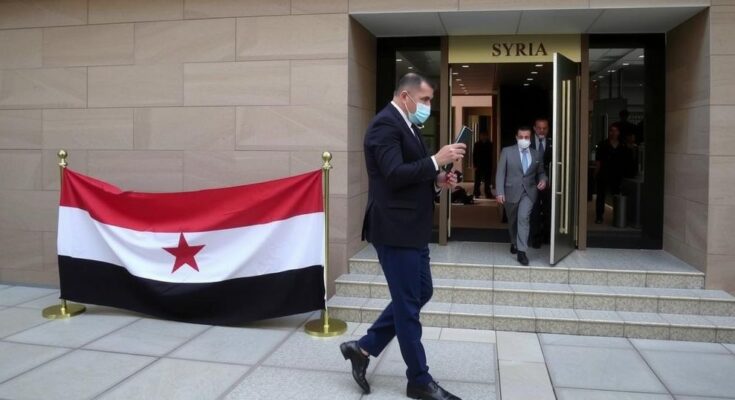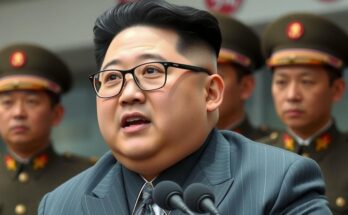Syria’s embassy in Lebanon has suspended consular services after two relatives of former President Bashar Assad were detained with forged passports. This decision coincides with the handover of several Syrians, including ex-army officers, to the new Syrian government, led by Hayat Tahrir al-Sham. Tensions persist as sporadic clashes occur, with regional countries establishing ties with the new rule amid concerns about women’s rights and governance.
On Saturday, Syria’s embassy in Lebanon announced a suspension of consular services following the arrest of two relatives of former President Bashar Assad at the Beirut airport with forged passports. This decision aligns with Lebanon’s recent handover of nearly seventy Syrians, including former Syrian army officers, to the newly established Syrian government led by Hayat Tahrir al-Sham (HTS). The embassy did not specify the reason for the service suspension, though it has been implicated in the forgery of the passports.
Security officials revealed that the passports presented by the arrested individuals were believed to have been forged at the embassy. Despite this, Assad’s uncle, Rifaat Assad, was able to leave Lebanon without issue, raising questions about the integrity of the embassy. Reports indicate that regional nations are quickly establishing relations with Syria’s new governance, as delegations from Libya and Bahrain visit Damascus.
HTS head Ahmad al-Sharaa, previously known as Abu Mohammed al-Golani, appears to have succeeded in alleviating concerns about the group’s potential oppressive governance. However, tensions remain high, with sporadic clashes occurring between HTS forces and pro-Assad militants. In addition, conflicts between Kurdish-led forces and Turkey-backed armed groups continue in northeastern regions of Syria, where the impact of Ankara’s influence increases anxiety among Kurdish communities.
Simultaneously, U.S. Secretary of State Antony Blinken engaged in discussions regarding the evolving situation in Syria with Turkish Foreign Minister Hakan Fidan, emphasizing the necessity of fostering a political process in Syria that values human rights and inclusivity. On the ground, protests advocating for women’s rights were organized in Hasaka, with participants expressing concerns that the new government has extremist tendencies that marginalize women’s roles in society. Amidst these developments, discussions about the representation of women in the new Syrian constitution are underway and deemed crucial for future governance.
This article reflects the ongoing complexity of the Syrian political landscape following the change in governance under Hayat Tahrir al-Sham (HTS). The backdrop includes the fallout from the Syrian civil war, during which Bashar Assad’s regime has faced widespread opposition, leading to the emergence of various factions, including HTS. The recent consular service suspension at the Syrian embassy in Lebanon signals the potential turmoil within the regime’s operations and the broader implications of regional relations as countries begin to forge ties with the new leadership. The narrative also highlights social issues, particularly the rights of women in a transforming political environment.
In conclusion, the suspension of services at Syria’s embassy in Lebanon illustrates the fragility of the new regime’s standing, especially in light of recent arrests linked to former President Assad’s family. Meanwhile, the handover of former Syrian officers from Lebanon signifies the ongoing realignment of power dynamics in Syria. The evolving relations with neighboring countries and the engagements with various factions illustrate the complexities that lie ahead, particularly concerning governance and social rights.
Original Source: apnews.com




